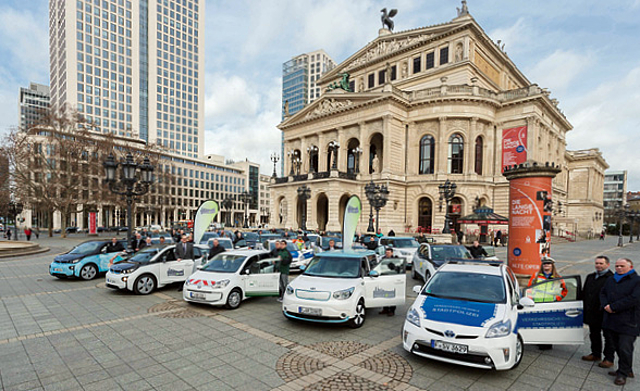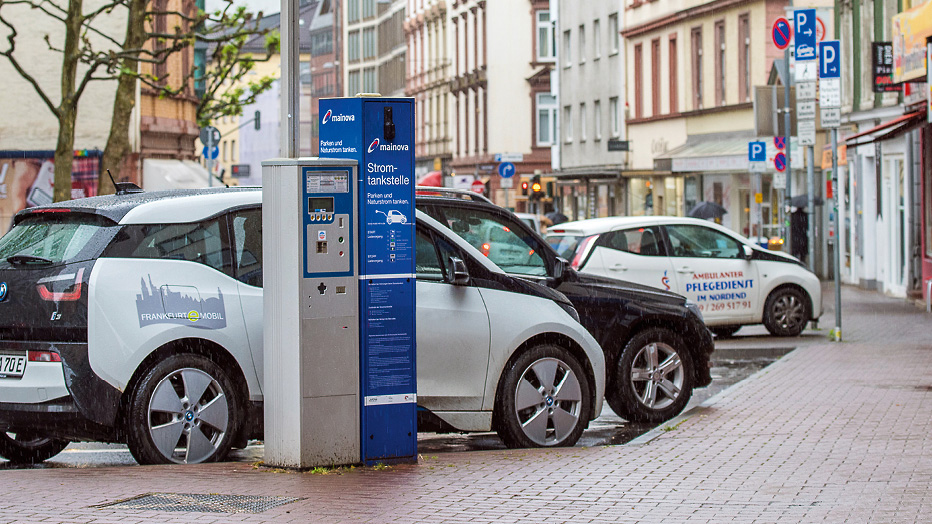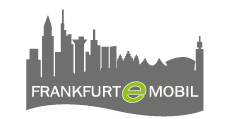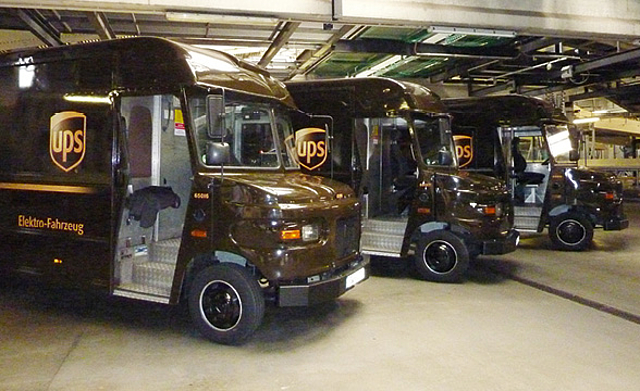Traffic jams, noise, pollutants and CO₂ emissions, not to forget the space needed for parked vehicles: alternative forms of mobility must be developed for big cities like Frankfurt with their many commuters and increasing business traffic.
Traffic in the cities must be organised so that pollution levels are low and the infrastructure and the urban environment must be used more efficiently. Alternative mobility scenarios and services and new drive technologies play an important role in this. One element is electric vehicles which, under certain operating conditions, offer ecological potential.
Electromobility – more than just a new engine
In May 2009, the City Council decided to make Frankfurt the forerunner in the field of electromobility.
In 2010, Frankfurt Economic Development, in cooperation with representatives of the municipal authorities, the State Government and industry drew up a strategy paper “Electromobility in Frankfurt in 2025 – Vision and Strategy“. This contains projects and measures intended to positively influence and promote the introduction of electromobility, while defining targets for the use of electromobility and complementary mobility services. In 2025, for example, 10 percent of the automotive traffic in Frankfurt should be electric and the proportion of low-noise and low-emission traffic inside Frankfurt’s Anlagenring should be 50 percent.
Since January 2011 all Frankfurt’s activities relating to electromobility have been marketed under the action label “Frankfurtemobil“. The purpose of the label is to raise public awareness of electromobility and to show how it can be used successfully. The Internet platform “Frankfurtemobil“ and a wide range of events all contribute to this end.
Business traffic and carpools as pioneers
Many carpools offer good operating conditions for electric vehicles, especially as pollution is critical over short distances in inner-city traffic. Vehicles can be charged overnight, after normal business hours. Frequent use improves the eco balance of the vehicles which, to some extent, are produced at an increased environmental cost. At the same time, these organisations can act as role models for more acceptance of this new technology.
Funding electric vehicles for craft enterprises
Short distances in the city centre: to promote and analyse the commercial use of electric vehicles, the State of Hessen and the cities of Frankfurt and Wiesbaden developed the “first! craft enterprises go for e-mobility” project. Craft enterprises based in Frankfurt and Wiesbaden received subsidies of up to 6,000 euros for each new electric vehicle purchased and used for three years. When the project finished at the end of 2014 just over 50 vehicles had been funded.

The City administration - a role model
The user and route profiles of the city administration – short distances in city traffic, overnight downtimes – are particularly well-suited for electromobility. Frankfurt subsidised municipal offices and companies in a procurement initiative to offset the higher acquisition costs of electric cars compared to conventionally-powered vehicles. In 2015, 35 electric vehicles were purchased for the city’s carpool and additional purchases were made beyond the depleted volume of funding.
Environmentally-friendly inner-city parcel delivery
Booming online trading has led to an increasing number of delivery tours on the “last mile“. In its Frankfurt branch UPS (United Parcel Service) have taken six electric-drive parcel delivery vehicles into service with great success. Electric vehicles, with emissions significantly lower than combustion engines, come to the fore especially in stop-and-go traffic.
Creating the infrastructure for easy charging
In 2010, as part of the “Frankfurt Model“, the Mainova AG and the ABG FRANKFURT HOLDING, under the aegis of their joint subsidiary ABGnova GmbH, developed the first public charging station system. Drivers of electric cars can use 14 charging stations in the whole urban area without having to register in advance with the electricity supplier. The energy costs are paid with the parking fees while combined charging and parking ticket machines avoid having to install additional machines in the streets. There are also charging stations in two car parks.
Developing new mobility concepts
Even if electromobility, as a drive concept described in the scenarios, can be implemented efficiently, this technology cannot be the answer to all the questions of city- and environmentally-friendly mobility. Challenges, such as the space needed for parked vehicles and increasing traffic volume, call for new mobility concepts, such as the introduction of the eTicket RheinMain, which enables the simple use of multi-modal mobility chains on a daily basis, or corporate mobility management as it is envisaged in the „Sustainable Commercial Area“ project.
The municipal housing agency ABG FRANKFURT HOLDING and the municipal energy provider Mainova AG have been partners in the car-sharing provider book-n-drive since 2011. ABG tenants enjoy many benefits. In the ABG FRANKFURT HOLDING’s Aktiv-Stadthaus there is also a book-n-drive station with parking spaces and charging points for electric cars and pedelecs which can be charged on site with electricity produced in the building.
Pedelecs in commuter traffic
70 percent of the commuters in the Rhein-Main conurbation travel distances of more than five kilometres. For these distances pedelecs are an attractive alternative to the car. The “bike + business 2.0” project, which was conducted by the FrankfurtRheinMain Regional Authority and the ADFC Hessen , examined the suitability of pedelecs in everyday commuter traffic. Ten employers took part with over 150 sponsored pedelecs. Employees, companies, researchers and manufacturers examined technical issues, the functional value in everyday life, usage habits and change-over options.
Building express cycle paths
Direct, well-constructed cycle paths are needed to make cycling generally more attractive to commuters, even over medium distances and also to suit the pedelecs’ higher speeds. The FrankfurtRheinMain Regional Authority chose the route from Frankfurt to Darmstadt as a pilot project for such express bicycle paths and set up a working group in which seven local communities and the University of Darmstadt provided academic support.
The findings of a feasibility study, with a catalogue of measures and cost calculation, have now been made available. A similar project for an express bicycle path between Frankfurt and Hanau is being planned.

Infrastructure
Loading stations with simplified charging and billing procedures for electric vehicles; express bicycle paths suitable for pedelecs and medium distances; eTicket RheinMain for easy utilisation of multi-modal mobility chains.

Pioneers as multipliers
Testing new drive technologies in places where they have advantages and are highly visible to the public (electric vehicles for logistics, craftsmen, city administration, pedelecs for commuters).
Environment Department
Tel +49 (0)69 212 39100 – Environment hotline
umwelttelefon(at)stadt-frankfurt.de





